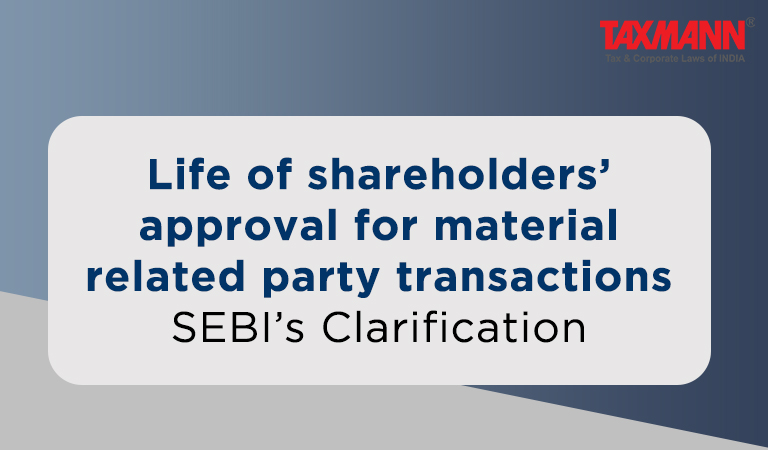Life of shareholders’ approval for material related party transactions | SEBI’s Clarification
- Blog|News|Company Law|
- 2 Min Read
- By Taxmann
- |
- Last Updated on 12 April, 2022

[2022] 137 taxmann.com 141 (Article)
It has been 5 months since notification of SEBI (Listing Obligations and Disclosure Requirements) (Sixth Amendment) Regulations, 2021 making major recast of the regulatory processes on related party transactions; the 8000 odd corporates consisting of the bulk of India’s financial as well as real sector continue to decode, interpret, and implement the revised framework. On the advocacy front, companies continue to make representations to, seek clarifications from SEBI ((including through stock exchanges). There is no doubt that SEBI, as a regulator, is open to interface with companies and is often receptive to useful suggestions.
Within a span of 10 days, the 8th April clarification is the second clarification on the approval for material related party transactions (‘material RPTs’). SEBI circular dated March 30, 2022 provided a one-time relaxation by allowing companies to seek prior approval for material RPTs at the first general meeting convened after April 1, 2022. This time the clarification vide SEBI circular dated April 8, 2022 pertains to the validity term of the prior approval of shareholders for material RPTs. The circular has been rolled out, clearly, in response to the representations made seeking clarity. The issue in hand is the insistence of the new RPT framework requiring prior approval of shareholders if the materiality threshold is crossed, which, now, has an absolute monetary frontier of Rs 1000 crores as well. So, when do companies seek shareholders’ approval, if they clearly estimate the value of the transactions with a related party crossing the frontier? The 30th March circular granted a time upto the first general meeting in FY 22-23, but what about the next financial year?
Click Here To Read The Full Article
Disclaimer: The content/information published on the website is only for general information of the user and shall not be construed as legal advice. While the Taxmann has exercised reasonable efforts to ensure the veracity of information/content published, Taxmann shall be under no liability in any manner whatsoever for incorrect information, if any.

Taxmann Publications has a dedicated in-house Research & Editorial Team. This team consists of a team of Chartered Accountants, Company Secretaries, and Lawyers. This team works under the guidance and supervision of editor-in-chief Mr Rakesh Bhargava.
The Research and Editorial Team is responsible for developing reliable and accurate content for the readers. The team follows the six-sigma approach to achieve the benchmark of zero error in its publications and research platforms. The team ensures that the following publication guidelines are thoroughly followed while developing the content:
- The statutory material is obtained only from the authorized and reliable sources
- All the latest developments in the judicial and legislative fields are covered
- Prepare the analytical write-ups on current, controversial, and important issues to help the readers to understand the concept and its implications
- Every content published by Taxmann is complete, accurate and lucid
- All evidence-based statements are supported with proper reference to Section, Circular No., Notification No. or citations
- The golden rules of grammar, style and consistency are thoroughly followed
- Font and size that’s easy to read and remain consistent across all imprint and digital publications are applied



 CA | CS | CMA
CA | CS | CMA
